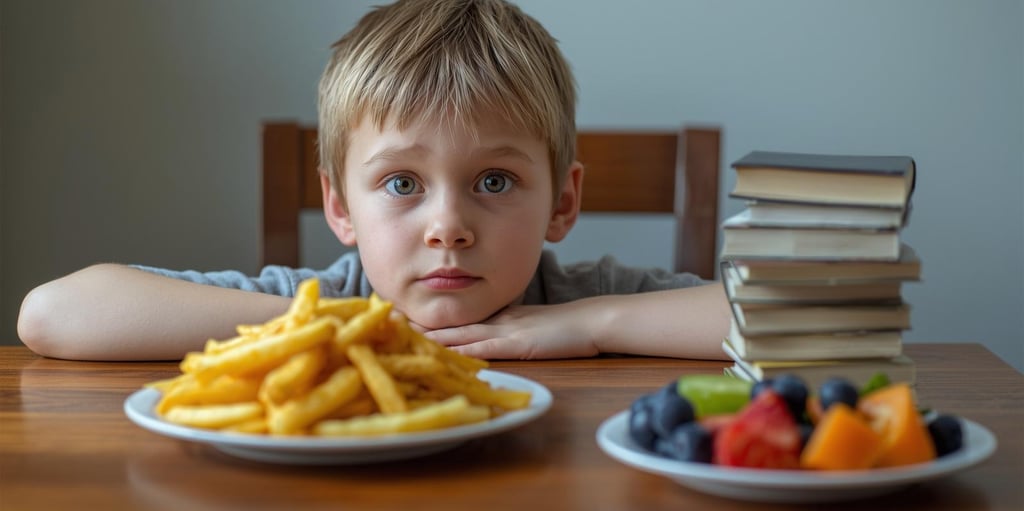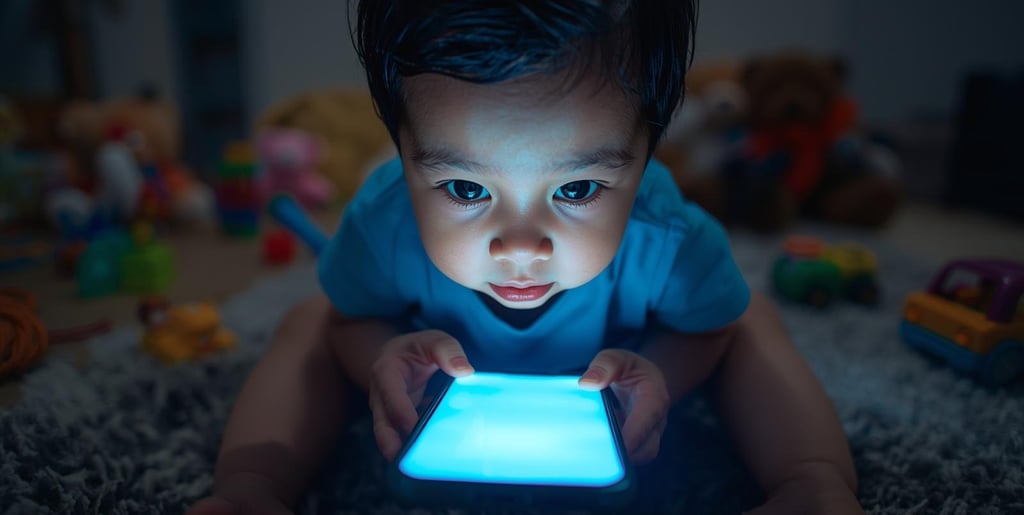Early Screen Addiction: How Short Videos Affect Child Development
This article explores how short videos and reels harm toddlers’ brain growth, focus, and speech. It warns parents about early screen addiction and its long-term effects.
Sonu Ahmed
9/5/20255 min read


A 5-year-old child staring at a glowing phone screen while books, toys, and puzzles lie ignored, showing the harmful effects of reels and short videos on child development.
Introduction: A Screen in Every Hand
It is said that “too much of anything is bad.” Once upon a time, this was about sweets or toys, but today the sweet poison is a glowing screen. Reels and shorts—those quick, flashy bites of entertainment—are becoming the new pacifiers for children. Parents hand them over thinking, “It’s just for a while.” But the truth? That “while” grows into a habit. Like moths attracted to a flame, children’s innocent eyes are drawn to these screens, often before they even learn how to tie their shoelaces. This is how early screen addiction in kids silently begins.
The Brain: A Garden Waiting to Bloom
The brain of a child between one and five is like fertile soil. Whatever seeds are planted in this stage, they bloom for life. But when the soil receives nothing but constant flashing images and sudden noises, the plants grow wild and weak. Neuroscientists often say the first five years shape the entire life of a human. So, if reels and short videos keep filling the garden with weeds of distraction, how will flowers of creativity and patience ever grow?
The Fast Food of Entertainment
Short videos are like junk food for the brain. They look colorful, they taste exciting, but they leave no nutrition behind. A child may giggle watching a dancing cartoon or a random skit, but ask them to recall it after a day, and it vanishes like smoke. Compare that with listening to a bedtime story: the story stays, the morals stay, and the imagination grows. After all, “slow and steady wins the race,” but reels are racing nowhere, just spinning in circles. This is one of the harmful effects of short videos on toddlers.
The Problem of Speech Delay
Doctors are now raising alarms: children addicted to reels and shorts are showing delays in speaking. Instead of babbling “mama” or “dada,” many toddlers remain silent spectators of endless screens. Words come from human voices, not digital echoes. When a screen talks more than a parent, how can a child learn the music of language? It’s like expecting a plant to grow in the desert without water—impossible. Studies link screen time in children with speech delay and poor vocabulary growth.


The Illusion of Learning
Some parents argue, “But my child is learning numbers and alphabets from these reels!” Let us not mistake parroting for learning. Reels are like fireworks—bright for a second, but gone in the blink of an eye. True learning is like a lamp: steady, slow, and glowing through practice and interaction. When a child learns “A for Apple” from a parent’s mouth, they feel the warmth, the bond, and the meaning. But from reels? It’s just an echo, a hollow show without roots.
Short Attention Spans: Butterflies Without Rest
Attention in children is like a butterfly. It should sit gently on one flower and drink the nectar. But reels turn that butterfly into a restless insect, jumping from one flower to another without pause. Today, it is a cartoon; after ten seconds, it is a dancing monkey; then, a superhero flies in. The child’s brain gets used to these constant shifts. Later, when they are asked to sit with a book or listen to a teacher, they run away in boredom. “You reap what you sow,” and the negative effects of reels on kids start showing up in school years.
The Bond Between Parent and Child
Screens often replace parents, like an uninvited guest who overstays. A crying toddler is given a phone, not a hug. Slowly, the bond weakens. Parents think they are free for a while, but what they lose is priceless. Children learn empathy, warmth, and language through human touch and words. A phone can never replace the lap of a mother or the stories of a father. It is like expecting the moonlight to give the warmth of the sun—it never can.


Satire of Modern Parenting
Here lies the irony: parents proudly post reels of their toddlers dancing to reels. They say, “Look how smart my baby is!” But behind the laughter lies silence. The child may dance today, but tomorrow they may struggle to form a sentence. Society cheers the circus without seeing the clown’s tears. Truly, “all that glitters is not gold.” And yet, this is how screen addiction among kids is celebrated as a trend.
The Long-Term Consequences
Children who grow up on short videos may face not just speech delays but also problems in social skills, focus, and emotional control. Imagine building a house on sand—it looks fine for a while, but it crumbles with time. Similarly, an overexposed child may seem happy and entertained, but as years pass, the cracks show. Anxiety, lack of patience, and low self-esteem become silent companions. These are some of the long-term harmful effects of screen time on children.
What Parents Can Do
It is never too late to change. Just as a gardener removes weeds and waters the roots, parents can replace screens with stories, play, and conversations. Instead of handing over reels, take your child to the park. Instead of a cartoon marathon, sit with clay, blocks, or crayons. It may take more effort, but “Rome was not built in a day.” Strong children are also not built in a day—they grow slowly with love, patience, and guidance.


Parents replacing screen addiction in kids with healthy activities like books, crayons, blocks, and play in a park.
Conclusion
The proverb says, “As you sow, so shall you reap.” What parents sow in the early years of a child will decide the fruits of their future. Short videos may look harmless, but they are silent thieves of attention, speech, and imagination. If childhood is a garden, then let’s fill it with the fragrance of stories, the colors of play, and the sunshine of human love. After all, children deserve flowers, not weeds.
FAQs
Q1. What is early screen addiction in kids?
Early screen addiction in kids happens when children between the ages of 1–6 spend too much time on phones, tablets, or TVs, especially watching reels or short videos. This habit affects their focus, learning, and social skills.
Q2. How do short videos affect child development?
Short videos overstimulate a child’s brain with fast-changing images and sounds. This can reduce attention span, slow speech development, and make it harder for kids to enjoy simple activities like reading or playing.
Q3. Can watching reels cause speech delay in toddlers?
Yes, research shows that children who spend long hours watching reels or short videos often experience speech delays. Kids learn to talk by hearing real voices and conversations, not by passively watching screens.
Q4. How much screen time is safe for children under 5?
According to health experts, children under 2 should avoid screens completely, and those between 2–5 should have no more than 1 hour of screen time per day. Quality matters—interactive learning with parents is better than passive watching.
Q5. What are the harmful effects of screen time on children?
The harmful effects include speech delays, short attention spans, poor social skills, disturbed sleep, and weaker bonds with parents. Over time, it can also cause anxiety and behavioral issues.
Contact
Get in touch for fashion training inquiries.
Subscribe
© 2025. All rights reserved.


